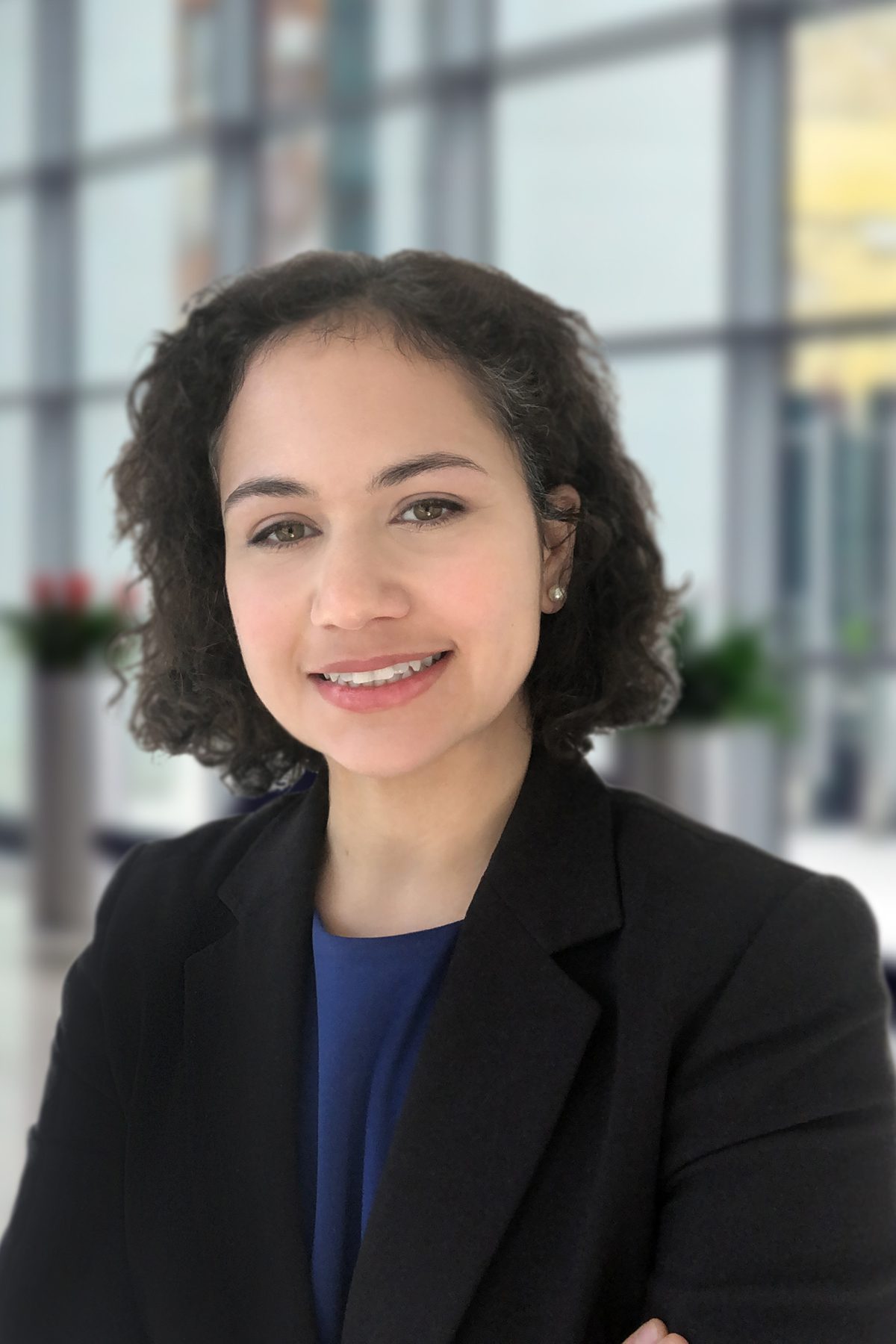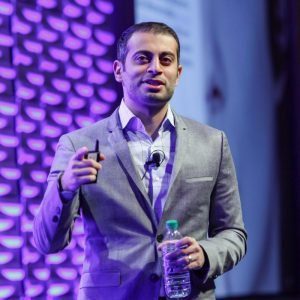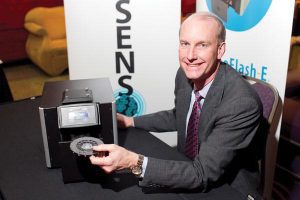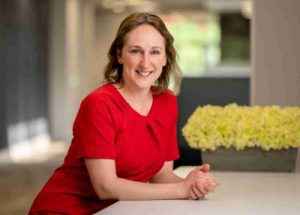
5 Questions With Priscilla Fussell, Ph.D., J.D., Associate at McBee Moore & Vanik IP, LLC
“5 Questions With…” is a weekly BioBuzz series where we reach out to interesting people in the BioHealth Capital Region to share a little about themselves, their work, and maybe something completely unrelated. This week we welcome Priscilla Fussell, Ph.D., J.D., Associate at McBee Moore & Vanik IP, LLC
Dr. Fussell represents a diverse array of clients in various intellectual property matters, including patent and trademark prosecution and litigation. She performs due diligence, freedom-to-operate, validity, and patentability analyses in the chemical and life sciences industries. She has a wide range of experience in the biotechnology, pharmaceutical, and chemical arts, including medical devices, biofuels, probiotics, plants, herbicides, fertilizers, seeds, nucleic acids, proteins, enzymes, carbohydrates, diagnostics, methods of treating cancer, cancer diagnostics, and agents for treating cancer. Dr. Fussell has negotiated and drafted a wide variety of agreements relating to intellectual property interests, including settlement agreements.
Dr. Fussell’s litigation experience includes the representation of clients in patent and trademark cases in federal court and proceedings before U.S. Trademark Trial and Appeal Board (TTAB). She regularly counsels clients on domestic and international trademark issues, including the clearance, prosecution, and enforcement of trademarks. Dr. Fussell also represents clients in the areas of trademark counseling and prosecution and represented clients in opposition proceedings before the TTAB.
1. Please introduce yourself to our audience by looking back at your education, training, and career.
I’ve always had a love of learning and thrived in challenging environments so it was a natural fit for me to be in the sciences. I was born in the Dominican Republic and came to the U.S. when I was seven. I still have memories of my first day at school in Long Island, struggling with English, and feeling quite overwhelmed. However, I quickly caught up.
My first research experience was a high school summer internship program through the Cornell University College of Veterinary Medicine. There, I got to work in the lab of Dr. David Robertshaw investigating sheep physiology and the effects of feeding and exercise on hematocrit levels. Dr. Robertshaw was truly one of those extraordinary teachers and mentors you meet in life. It was a great beginning to my love of my research and igniting the investigative mindset. With
research, you are really expected to learn by doing, whether it’s figuring out where the jugular vein of a sheep is to inject a bolus or how to calculate blood volume.
Over the next several years, while finishing high school and during my undergrad at Cornell University, my research focused on the malaria parasite, with me participating in several research programs at NYU and at Harvard School of Public Health. At Cornell, I had the opportunity to conduct my own research and work in several laboratories to supplement my financial aid package. It was really a great opportunity to work in the plant biotechnology and chem labs. For my PhD, I went to the NYU School of Medicine where I really learned the
foundations of research. A large part of our training was learning to break down complex subjects and communicating your research effectively to all audiences, not just your colleagues.
I left the bench and went to law school at the University of Maryland School of Law. I really found my voice during this time. I had the opportunity to intern at the USPTO and John Hopkins Tech Transfer. After law school, I worked at both small and large international law firms, representing clients in both patent and trademark matters. I also founded my own company, Occam’s Patent Search Group, performing prior art and trademark clearance searches.
2. You’ve been part of the team at McBee Moore & Vanik for just over a year now. Tell us about your role with the company and a success story you’d like to share from your first year.
I am a patent and trademark attorney. My practice focuses on all aspects of patent law, with an emphasis on the chemical and science industries. I prepare and prosecute patent applications for universities, start-ups, mid-sized, and large US and international companies in the biotechnology, agricultural, pharmaceutical, and chemical fields. I also provide advice on claim construction, infringement, and validity issues. I perform trademark counseling, clearance searches, and prosecution services. Due to my litigation background, I also assist trademark litigation before TTAB and federal court proceedings.
The opportunities at MMV IP have truly been unique and exciting. I have represented an emerging software company in litigation and TTAB proceedings and successfully obtained a granted motion to dismiss on a trademark infringement claim. I also managed a life science company’s patent portfolio, covering small molecules for nitric oxide-based therapies. Finally, I worked with in-house counsel for an emerging international immunotherapy company on contract issues, including research collaboration and licensing agreements.
Someone once said that law firms are the firefighters and in-house counsel is the fire marshal. The law firms are always putting out fires while in-house counsel works to prevent future fires. Being part of the “firefighters,” I find it exciting going out there and meeting clients, discussing new technology, and coming up with solutions. It’s really an adventure.
3. You’re a Ph.D. and have your JD as well. This is a common theme at MMV IP, but what specifically could you share about the value of your Ph.D. transitioning from academia to a career in law?
A large part of the PhD training, besides the long hours in the lab, is learning to think critically, writing well, breaking down complex information, and conveying your thoughts clearly. All of these skills are incredibly valuable when practicing law.
If we are talking patent law, there are three main areas of practice and those are prosecution, litigation, and transactions. Patent prosecution involves the process of obtaining a patent and working with the United States Patent & Trademark Office (USPTO. Patent prosecution will most heavily rely on the ability to learn different technologies and to analyze scientific literature. Patent litigation involves defending or challenging IP, which can involve federal court or the Patent & Trademark Appeal Board (PTAB). Patent litigation still involves understanding and explaining complex concepts, technical disclosures but there is a heavier reliance on writing and oral skills. Then you have transactional work which can involve licensing or collaboration agreements that relies heavily on writing skills.
4. You are also the Women In Bio (WIB) MAPS Co-Vice Chair. What is the MAPS program and what opportunity are you most excited to implement in this role?
Women In Bio (WIB) is an organization of professional women in the biotech industry that focuses on promoting professional development, leadership, mentorship, and entrepreneurship of women in the life sciences. I am excited to be part of the leadership of the MAPS programs because it really encompasses the goal of WIB, connecting women and advancing members professional development.
WIB is a national organization, and I am part of the Women in Bio Capital Region chapter. MAPS, which stands for Mentorship, Advisors, Peers, and Sponsorship, facilitates networking and professional development through peer groups, with different groups covering various needs and goals.
Currently, we have local peer groups, the Executive Mentoring Program (eMAPS), and the Career Development Group (CareerMAPS) that meet on a recurring basis. The peer groups are local informal meetings of women who are interested in discussing topics of common professional interest and provide consistent support, advice, and encouragement to each other. The eMAPS programs offer professional development for executives, directors, and other senior leaders. The CareerMAPS focuses on the skills needed to successfully find a job, negotiate a promotion, and/or make a career transition. Many of the programs and information meetings will cover topics like: how to negotiate a higher salary, personal branding, resume building, and LinkedIn workshops.
What I am most excited about is my work to initiate more contributions from membership. My plan is to promote this via information sessions, where members can share stories about their careers and their expertise. I believe that everyone’s experience is valuable and has something to bring to the table. Utilizing these diverse experiences and knowledge is what can elevate an organization.
This informational session will allow others to learn about the diverse professional background and skills of our members, as well as the different companies in Maryland. I highly recommend joining a local MAPS group as we have several locations: NoVA, Montgomery County, Baltimore, Washington DC, and Frederick. Great opportunity to connect with the life science community in your area.
5. As a working parent, what skill are you most proud of honing over the past 18 months? And what still presents a challenge?
I think every working parent applies management skills in their home, but during the pandemic I really pressed on that gas pedal and committed to the jump. I was at a point in my career where I really understood my strengths and it finally dawned on me that I could translate the skills where I was excelling at work into my home and my family. This involved an increase in communication within the family and with outside parties, acting as the central communicating hub and communicating clearly with everyone, facilitating discussion about family goals, mapping out goals, prioritizing goals, maintaining an open-door policy, assessing everyone’s strengths and weaknesses and working around them, and having flexibility.
It was extra time that I invested for my “accelerated role” but ultimately worth it as one family goal was quickly reached: reducing family stress! There are still challenges of course, but again the reduction in stress has been pivotal.
Thank you to Priscilla Fussell, Ph.D., J.D., Associate at McBee Moore & Vanik IP, LLC for participating in the “5 Questions With” BioBuzz series, and stay tuned for more interviews with others from across the BioHealth Capital Region and beyond.
- About the Author
- Latest Posts
BioBuzz is a community led, experience focused, biotech and life sciences media and events company. BioBuzz highlights regional breaking news, industry professionals, jobs, events, and resources for business and career growth. Their weekly newsletter is subscribed to by thousands in the BioHealth Capital Region and Greater Philadelphia as the go-to for industry updates.







